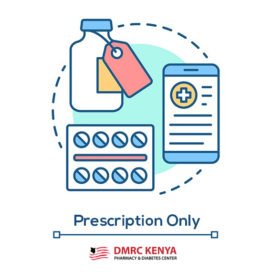
KSh12,220.00
Share On
Pexola 0.125mg tablets contain Pramipexole, which treats Parkinson’s disease and restless leg syndrome. It works by increasing the action of dopamine, a chemical messenger that controls movement in the brain.
PEXOLA tablet treats signs and symptoms of idiopathic Parkinson’s disease in adults. One can use it alone in the course of the disease, when late effects of levodopa begin to decrease, or when the therapeutic effect fluctuates as the change becomes apparent.
Posology/frequency and duration of administration:
PEXOLA is an oral release formulation of pramipexole once daily.
Forgotten doses:
Suppose one misses a dose of PEXOLA 0.125mg tablets. Take it within 12 hours of the time that patients should take the amount. If more than 12 hours have passed, skip the missed dose and take it on the next day.
Termination of Treatment:
Sudden discontinuation of dopaminergic treatment may lead to the development of the neuroleptic malignant syndrome.
Application:
Swallow PEXOLA 0.125mg tablets whole with water, do not chew, break, or crush. In addition, one can take the tablets with or without food at the same time every day.
Renal failure:
Elimination of pramipexole is dependent on renal function. Use the following dose scheme:
If the kidney function decreases during maintenance therapy, caregivers should use the above recommendations.
Hepatic impairment:
Since approximately 90% of the absorbed active substance excretes through the kidneys, dose adjustment in patients with a hepatic impairment will probably not be necessary. However, investigations on the potential effect of liver failure on PEXOLA pharmacokinetics are yet to happen.
Pediatric population:
The PEXOLA 0.125mg tablets have no use in the pediatric population in Parkinson’s disease.
Hallucinations
It is a known side effect of dopamine agonists or levodopa therapy. Caregivers should warn patients that hallucinations (primarily visual) may occur.
Somnolence.
Pramipexole was associated with drowsiness and sudden onset of falling asleep, especially in patients with Parkinson’s disease. Sudden onset of sleep seizures occurring during daily living activities and without any symptoms have are uncommon; this may happen in some cases without awareness or any stimulatory symptoms.
Caregivers should warn patients about this issue. In addition, they should be careful using this medicine, mainly operating vehicles and machines.
Patients who experience drowsiness or sudden sleep seizures should avoid using tools and machinery. It may also be an excellent option to reduce the dose or terminate the treatment. Due to possible additive effects, patients should be careful when taking other sedative drugs or alcohol when using a medication containing pramipexol.
Impulse control disorder
Caregivers should monitor Patients regularly for the possibility of developing impulse control disorders.
Individuals interested in the Care and Treatment of patients should be made aware of the behavioral symptoms of impulse control disorders such as pathological gambling, increased libido, hypersexuality, compulsive spending or shopping, obstructive eating, and over-eating in patients treated with dopamine agonists, including PEXOLA.
If such symptoms develop, the dose should be reduced or stepped down in steps.
Mania and delirium
Patients should monitor and be monitored regularly for the risk of mania and delirium development. Patients and those caring for the patient should be aware that mania and delirium may occur in patients treated with pramipexole. If such symptoms develop, discontinuation of the drug by dose reduction/dose reduction should be an option.
Patients with psychotic disorders
Treatment with dopamine agonists in patients with psychotic disorders should only happen if the potential benefit from treatment is higher than the potential risk. Patients should avoid the simultaneous use of pramipexole and antipsychotic drugs.
Ophthalmological monitoring
In case of regular or visual abnormalities, ophthalmological monitoring should take place.
Severe cardiovascular disease
Patients should take care in case of severe cardiovascular disease. Due to the risk of postural hypotension associated with dopaminergic therapy, it is recommended to monitor blood pressure, especially at the beginning of treatment.
Stool remnants
Some patients have reported residues in their feces that resemble intact PEXOLA tablets. If the patient reports such an observation, the doctor should re-evaluate the patient’s response to treatment.
General recommendation
Women with childbearing potential /Contraception; The women with childbearing potential should use contraceptive methods considered medically adequate during treatment.
PEXOLA 0.125mg tablets should not be used unless explicitly necessary during pregnancy. Patients should use it only if its potential benefits outweigh the potential risk to the fetus.
Lactation
Inhibition of lactation often occurs because pramipexole therapy inhibits prolactin secretion in humans.
Patients should not use PEXOLA 0.125mg tablets during breastfeeding. However, if patients cannot avoid its use, discontinue breastfeeding.
PEXOLA 0.125mg tablets can have significant effects on the ability to drive and use machines.
Hallucinations or drowsiness may occur.
Patients who use PEXOLA 0.125mg tablets with tired and sleepy episodes should avoid cautionary activities. Be warned that there is a risk of severe injury or death to himself or others due to impaired eye.
Expected adverse reactions
The following adverse reactions are expected during PEXOLA 0.125mg tablets use;
Get more products and services from DMRC KENYA right here. For a more interactive platform, be sure to find us on Facebook by clicking right here.
We are a Kenyan-owned online Pharmacy and Diabetes Care Center built from a patient-perspective. We are a licensed Online Pharmacy operating from Nairobi and delivering medical supplies countrywide.